I worship the power of these lovely two/
With that adoring love known to so few/
'Tis indeed a miracle, one must feel/
That two such heavenly creatures are real. |
Taken from 'Ones That I Worship,'
Pauline Yvonne Parker, 1953* |
| "All extremes of feeling are allied with madness." |
| Virgina Woolf, Orlando |
When you hear the name Peter Jackson, which film springs to mind? For some it may well be the pop culture juggernaut that is The Lord of the Rings Trilogy, or perhaps one of its predecessors, the multi award-winning King Kong, or the flawed yet visually stunning The Lovely Bones came to mind instead. Some reading this may be long-time admirers of his work with a penchant for his early comedy horrors, Bad Taste and Braindead. For me, no matter the box-office successes and awards brought by Hobbits, Elves or giant Gorillas, Peter Jackson's name will, probably for the rest of my filmgoing life, always mean Heavenly Creatures.
Given Jackson's considerable talent and achievements you could be forgiven for wondering why. It's nothing to do with any kind of cultural snobbery connected to Hollywood and big budget cinema, it's purely connected to the fact that Heavenly Creatures is an entirely unique experience that I've yet to see repeated by any other director or indeed, some would argue, Jackson himself.
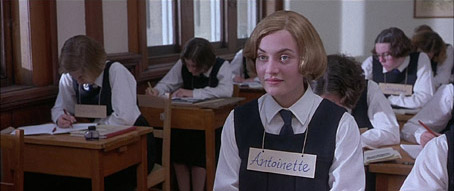
The story focuses on two teenage schoolgirls, Pauline Parker (Melanie Lynskey) and Juliet Hulme (Kate Winslet). When Juliet's father, the eminent physicist Henry Hulme (Clive Merrison), takes up an academic position at Canterbury University College, she moves there, with her mother Hilda (Diane Kent, brimming with '50s glamour and elegance) and younger brother Jonathan (Ben Skellerup), leaving England and her old life behind. Shy and socially awkward, Pauline warms to the bright, confident and rebellious Juliet, and the girls strike up a friendship. They find common ground in their love of writing and music, reading to each other and chatting to pass the time during school gym classes, which they are unable to take part in due to the after-effects of their childhood illnesses. At first, Pauline's parents Honora (a wonderful Sarah Pierse) and Herbert Rieper (Simon O'Connor), are supportive of the new friendship, clearly enamoured with the soft-spoken, well-mannered girl. Juliet, meanwhile seems to relish the homely atmosphere at Pauline's house, which is markedly different to her own. As the girls grow closer, they begin to create stories and clay figures together, building a fantasy kingdom called Borovnia, imagining their favourite stars James Mason and Mario Lanza as part of their new world.
When Juliet falls ill with Tuberculosis and is sent away to recuperate, the girls are devastated by the separation. They come to rely on each other even more when Juliet's parents leave for an academic conference in England, and the Riepers are her only support. As Juliet convalesces, isolated and lonely, the girls begin to write letters to each other, descending ever deeper into their creation, dreaming of stardom in Hollywood once their work is read. Pauline's schoolwork begins to suffer, and she spirals out of control, refusing to listen to her parents' pleas to change her behaviour. After Pauline enters into an affair with the lodger, John (Jed Brophy), and he's thrown out of the house, her mother insists she get a job and pay her way. Frustrated by her mother's constant interference, the relationship between the two begins to break down, and instead of resolving her problems, she targets all of her hatred and resentment towards her mother.
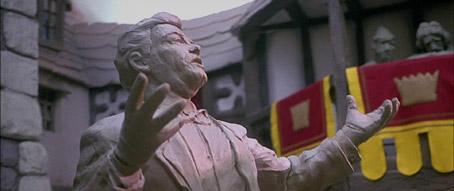
Upon Juliet's return, the Hulmes and the Riepers begin to share concerns about the nature of the girls' friendship and their closeness, taking steps to break their bond. As the Hulmes' marriage breaks down, the separation Juliet and Pauline have suffered previously threatens to be permanent, when Juliet learns she's set to leave for South Africa to live with an aunt. Determined they will stay together, Pauline appeals to her mother to be allowed to go with Juliet; when she refuses, Pauline begins to plot revenge, seeing her mother as the barrier to her happiness.
The film was Jackson's break into the mainstream, and marked the film debut of then unknown actresses Kate Winslet and Melanie Lynskey, who, as the lynchpin of the story and the very fabric of Heavenly Creatures, give incredibly assured performances, despite the fact they were just seventeen and fifteen respectively at the time. Those performances are one of the many reasons why the film is so memorable. In today's cinematic landscape, it's hard to imagine a director taking such a risk or indeed such a film being made, as, even then, it was a very different kind of film to the usual Miramax fare. Even so, the film drew praise from voting panels at the time of release, earning Jackson several nominations and awards, including an Academy Award nomination for Best Screenplay and a high-profile win at 1994's Venice Film Festival, where it was awarded The Silver Lion. Viewing audiences also connected with the material, and in the years since its release, the film has become something of a cult favourite, rising steadily along with the careers of those involved.
Though his name alone can now command big budgets and even bigger stories, Jackson's still an artist at work; breaking new ground through the innovations of his award-winning company, Weta Digital. Formed in 1993 specifically for Heavenly Creatures, the company has been responsible for the visual effects in the majority of Jackson's output, and those of others, including James Cameron's Avatar, Neill Blomkamp's District 9, and Robert Wyatt's Rise of the Planet of the Apes. Even in this age of sophisticated CGI, the modelling work used to create Borovnia and its inhabitants are still extraordinary, and watching the figures interact with Juliet holds a level of fascination all of its own. Of course, rather than wowing to the degree they once did, they stir nostalgia instead, and carry, as Kim Newman comments in the supplemental feature, an appropriate level of "antiquated charm," particularly for those who grew up with a close eye on the evolution of animation techniques.
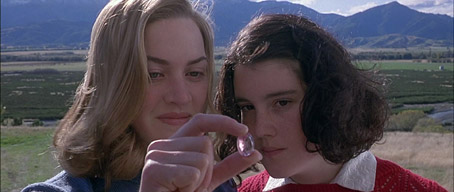
Terms like 'visionary' and 'spellbinding' are now rather hackneyed and often misappropriated thanks to constant overuse and marketing spin, but there are rare occasions when such statements are valid. This film can, and indeed should be considered in those terms. Visceral and emotionally absorbing, it's stylistically bold, and full of a curious frenzied energy generated by the work of editor Jamie Selkirk and cinematographer Alun Bollinger (both of whom he would continue to collaborate with Jackson throughout his career). Heavenly Creatures is a polarizing film. You either enter wholesale into the fantastical world it presents, or are confused by it and reject it entirely. The film's heightened sense of reality is tempered by a disquieting chill that runs counter to everything we see and hear. These bright and brilliant girls, intent on making a world, and a future for themselves quite different to that of their parents, driven to murderous intent by the threat of separation, aren't a work of fiction, but of cold, hard, fact.
Based upon the notorious 1954 Parker-Hulme murder case in Christchurch, New Zealand, Heavenly Creatures was, at the time of its production, just one of numerous related projects in development, including a script by writer Angela Carter; another by Australian playwright Louis Nowra, and one from Dustin Hoffman's Punch Productions, which Jackson himself was asked to direct. Jackson eventually began a project of his own, co-writing the script along with his future wife, Fran Walsh, who had been fascinated by the case for some years.
Though some elements of the case were simplified for the purposes of the narrative, Jackson and his team were careful to ensure that what was shown on screen was accurate, particularly when casting the roles of Juliet and Pauline. Their guiding principle was to choose actresses with a strong physical likeness to Juliet and Pauline, as well as being close to their age. Lynskey was found by Fran Walsh in a local school after earlier casting sessions by Liz Mullane were unsuccessful, and Winslet beat out a 175 other girls for the part. When it came to the story itself, Jackson and Walsh drew inspiration from interviews with Christchurch locals and friends of the girls, as well as lifting excerpts from Pauline's diaries, which she kept throughout her friendship with Juliet. The entries appear throughout the film, in voiceover, which not only gives shape to the narrative so we grasp how much time is passing, but also grounds us in Pauline's psyche, helps us understand how much she and Juliet are changing. In doing so, Heavenly Creatures humanises rather than demonises the girls. Through the work of the Weta team, we enter completely into Pauline and Juliet's psychosis, so we learn who they are beyond the salacious details of their crime. Sensationalised treatment typified the press coverage of the case at the time, and Jackson was at pains not to replicate it, conscious that dealing with real lives and real emotions, carries with it real consequences.
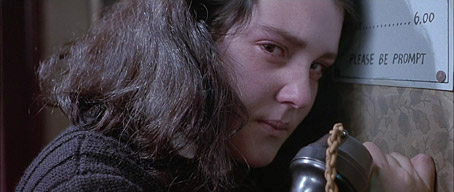
To pick standout scenes in a film like this one is near impossible, because there's little that can be left out of such discussion. Over the course of the film we run the emotional gamut, from the highest of highs, such as when we witness the girls unlock the key to 'The Fourth World' for the first time, at the peak of the film's heightened reality; to the lowest of lows, when we witness murder first hand, a moment so rooted in reality, we can practically feel the ground of Victoria Park under our feet. Heavenly Creatures is at its most challenging in between those two extremes, when it shows moments of play, of sulky adolescent expressions of superiority, and the mundane nature of going to school, doing chores, having a friend over for tea and being embarrassed by parents. In Jackson's hands these girls are not monsters at all, they're ordinary schoolgirls, and that's what makes their actions so chilling and the film itself so memorable.
It would be easy for Jackson to lay blame and cast judgement, but instead, those decisions are left for us to make. Heavenly Creatures is a film that tests, morally, spiritually and emotionally. It also asks questions of it's audience, forcing us to analyse and to ponder, but most difficult of all; to empathise as we watch angels fall.
Most ardent fans of the film will know that several cuts exist, varying in length between 95 and a 109 minutes (I've yet to decide which version I prefer, as each has its own particular merits). This release falls into the shorter category, but that's by no means a disappointment, not when those minutes look as good as this. Having seen the film across all formats, from VHS right through to this Blu-ray release, I can honestly say that 'The Fourth World' has never looked so glorious.
As releases go, Heavenly Creatures always suffered with poor treatment. Thankfully, Peccadillo's disc rights this wrong. In the past, the film has not only been presented in the wrong ratio, but also had poor transfer quality to boot (one release in particular holds the crown for the worst transfer in my entire DVD collection. I kid you not!). So, putting this one the drawer for the first time was a real treat. Though it may have been a long time coming, it was most certainly worth the wait. Yes, there is some softening of the otherwise solid black levels in the darekest scenes, and grain is sometimes visible, but the sheer crispness of the detail, the warm beauty of the colours and the often sublimely judged contrast lift it so far above any previous home video version that it feels like a whole new film.
It's worth noting here that there have been a couple of very negative reviews of the transfer quality posted on Amazon. This is due to a mastering fault on a small number of release discs, which in the comments section of one of these reviews, Peccadillo's Tom Abell offers to replace for the correctly mastered ones, should you happen to land one. Believe me, it's worth it.
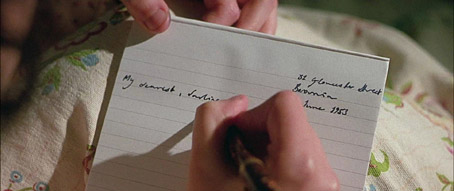
Rather than plump for a surround recoding (only Jackson himself can produce a true remix), Peccadillo have gone with the original Dolby Digital 2.0 stereo track. While not displaying the scrispness and range of a modern mainstream mix, this is still a clear and problem-free track which does well by the music and displays sometimes impressive frontal separation, particularly evident in the background sounds in the hospital scenes.
There are many films on my Blu-ray wishlist, and Heavenly Creatures is close to the top. Reputation notwithstanding, once the medium appeared, I felt that it was one of those films made for it, but didn't ever think it would be granted one. It's always nice to be proved wrong.
The hard work that's gone into this package is obvious, and improves significantly on the discs already available. There's even something to get your teeth into on the extras front, and a nicely designed menu to navigate through. In these feature-laden times, it might seem a little odd to be celebrating the existence of supplemental material, but after years of suffering barebones DVDs, brought to market after the successes of Titanic and The Lord of the Rings Trilogy, it's hard not to, especially when the existence of such discs are clearly driven by the ring of a till, rather than loftier notions like love, care or respect for the film itself.
Looking Back: Kim Newman, Rosie Fletcher and Alan Jones on Heavenly Creatures (29:43)
Produced by Simon Savory and Jason Bradbury, and filmed at the ICA in London, this reflective discussion is a great watch. Featuring contributions from famed horror writer and critic, Kim Newman, Rosie Fletcher (News Editor of Total Film and regular contributor to SFX magazine), and Alan Jones (critic, broadcaster and co-director of Fright Fest), this panel covers a great deal of ground. Topics explored range from their favourite scenes, to the making and reception of the film, with, of course, some time devoted to the careers of all involved. There are some great personal insights, particularly from Jones who saw the film at its Venice premiere in 1994 and has spoken at length with Jackson about the project. The balance of material is great, and the admiration, affection and indeed passion that Newman, Fletcher, and Jones have for the film certainly comes across. Incredibly enjoyable.
Note: For viewers coming to Heavenly Creatures completely fresh, then I'd advise that you watch this feature after the film itself, because it does contain spoilers both in the form of interspersed film clips and discussion comments.
Trailer (1:49)
Part of the selection of trailers showcasing Peccadillo's release catalogue, this has been specifically created for the remaster. A great sell for that's peppered with press quotes, and certainly celebrates the film's many achievements. It's interesting to see just how different it is from the trailers presented on earlier releases. There's something rather beguiling, and, dare I say, languid, about this one that makes it stand out. Gravel-voiced Trailer Man is nowhere to be found, and it flows beautifully too.
Picture Gallery (3:02)
A rolling slideshow of twenty images, both in colour and black and white, set to Peter Dasent's beautiful score. A nice thing to look through, that showcases both the look of the film, and the photographic skill of Jackson's frequent set photographer, the late Pierre Vinet.
Also included are four Limited Edition Postcards featuring stills and quotes from the film. Lovely.
Heavenly Creatures deftly tiptoes the line between the real and the unreal, but frequently allows them to blur. It remains an incredibly powerful film, both in terms of narrative and visual style. Its marriage of the dark and the comic, with just a dash of camp excess, makes for a compelling viewing experience. The passage of time since its release has seen the film grow in stature, to something of a cult favourite, and it's easy to see why. A landmark film for New Zealand cinema, Jackson, Winslet and Lynskey, this release is long overdue, and if you're yet to see it, Peccadillo's remaster is the perfect way to do so. Highly recommended.
*Taken from Adam Abram's comprehensive Heavenly Creatures fansite, http://www.adamabrams.com/hc/
|